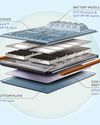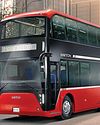
Apollo Tyres will leverage technology, digitalisation, branding, sustainability and people growth as its five key enablers to reach $5 billion revenue by FY26, nearly twice from the present level of $2.8 billion.
The growth is expected to be achieved at minimal capex as it has already made substantial investments over the decade. Neeraj Kanwar, Vice Chairman & MD, told Autocar Professional that the last 11 years had a “very heavy capital-intensive cycle” with the setting up of huge plants in Chennai, Hungary and now in Andhra Pradesh.
From his point of view, the time is now right to turn to machine learning and artificial intelligence to optimally increase productivity. "There is enhanced capacity and in the next two years it is going to be a capex light for us," said Kanwar.
Apollo wants to achieve its goal without compromising on return on capital employed which it expects to be 12-15 percent. The target for earnings before interests, taxes, depreciation and amortisation is around 15 percent while the net debt to- EBITDA ratio is targeted at less than 2x.
Apollo is also keen on becoming carbon-neutral by 2050. Kanwar said there were a host of issues to deal with — thanks to the war in Ukraine and the recent lockdown in China — which has dealt a body-blow to the industry.
“The supply chain situation today is cumbersome and we have resorted to digitalisation to help us in goods movement from the factory to customers and even further to vendors,” said Kanwar. The company has commissioned a digital innovation centre in London.
This story is from the {{IssueName}} edition of {{MagazineName}}.
Start your 7-day Magzter GOLD free trial to access thousands of curated premium stories, and 9,000+ magazines and newspapers.
Already a subscriber ? Sign In
This story is from the {{IssueName}} edition of {{MagazineName}}.
Start your 7-day Magzter GOLD free trial to access thousands of curated premium stories, and 9,000+ magazines and newspapers.
Already a subscriber? Sign In

Spain's Fersa Group invests in India-based Delux Bearings
Besides theRs100 croreinvestment, the Indian company gets access toadvanced technologies and bearings with arange of applications that willhelpinits global growth strategy, writes Manobhava Baruah.

Tata Autocomp to open compact dual-clutch transmission plant
Amidthe country’s growing need for personal mobility with easy manoeuvrability, comes the demand for vehicles with automatic transmission. Tata AutoCompisready tomovein writes Shruti Mishra.

Pankaj Munjal-backed Hero Motors raises equity from GEF Cap
The company willinvest Rs1,500 crore over thenextthree years andit expects 60 percent ofits turnover to come fromelectric vehicle parts. Itaims to becomea Global EV Solutions Company from India

New age thermoplastics for next-generation EV batteries
Saudi-based global materials major SABIChas developed cutting edgein fire-resistant polymers and flame-retardant materials that comply with various EV battery safety standards across the world.

Switch Mobility to meet growing e-bus demand with fresh capex
Oncourse for abillion-dollar business, the company is exploringa possibility of operating satellite factories across the country to serve different geographies, write ShahkarAbidi and Ketan Thakkar.

Kia India to invest Rs 2,000 crore in EVS, to introduce new e-RV in 2025
New investmentto drive R&D, infrastructure development and manufacturing capabilities. The company willlocally produce EVsin India with possibility of exports as well, writes Mayank Dhingra.

"The government has given enough time for indigenisation but the industry has not taken it seriously"
Amitabh Saran, Founder and CEO, Altigreen, shares his views on problems inthe EV industry and battery localisation solutions with Amit Vijay M.

TATA MOTORS SEES ONE INTWO CARS SOLDAS EVS BY 2030
The company aims to offer wider choices withnew EVs that may straddle a pricebracket of Rs20to 40lakhinthe coming years, writes Ketan Thakkar.

MG Motor India in expansion drive, to invest $100 million
The investment willbe usedtoramp up existing production capacity from1.2to1.4-15lakh units per annum atthe automaker's Halol plantin Gujarat, writes Ketan Thakkar.

"Technology and its multiplier effect are driving business transformations and customer experiences"
Technical Centre India is one of Continental’s largest research and development centres in the world, andasa Centre of Competence’ it also develops customised products for the BRIC countries.